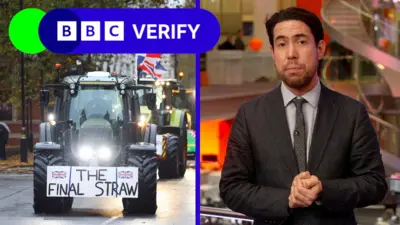We've updated our Privacy and Cookies Policy
We've made some important changes to our Privacy and Cookies Policy and we want you to know what this means for you and your data.
EU to let states rule on GM crops
EU officials plan to give the 27 member states the freedom to grow, restrict or ban genetically modified (GM) crops.
The European Commission says different local conditions mean EU countries need more flexibility to decide where, if at all, GM crops are grown.
But the EU will continue to study the health impact of GM crops under its current authorisation system.
Currently a type of maize called MON 810 is the only GM food cultivated commercially in the EU.
A GM type of potato, called Amflora, has also been authorised, but it is harvested for industrial starch.
Bureaucratic bottleneck
Applications to cultivate new GM crops - also known as genetically modified organisms (GMOs) - have stalled in the EU because member states take different positions on their safety.
The Commission aims to let the states establish GMO-free areas if they want to avoid any unintended presence of GMOs in conventional and organic crops.
Supporters of GMOs argue that they deliver higher yields and resistance to pests, requiring less fertiliser and pesticides.
Opponents say more scientific data is needed, arguing that their long-term genetic impact on humans and wildlife could be harmful.
MON 810 is banned in six EU states - Austria, France, Germany, Greece, Hungary and Luxembourg.
The Commission's proposal to change the rules on GMOs, announced on Tuesday, still requires approval by the EU governments and European Parliament.
The EU Health Commissioner, John Dalli, said "experience with GMOs so far shows that member states need more flexibility to organise the co-existence of GM and other types of crops such as conventional and organic crops".
"Granting genuine freedom on grounds other than those based on a scientific assessment of health and environmental risks also necessitates a change to the current legislation. I stress that the EU-wide authorisation system, based on solid science, remains fully in place."
Mixed reaction
The environmental lobby group Friends of the Earth Europe voiced dismay at the Commission's move.
Its food campaigner Mute Schimpf said the Commission "continues to fail to protect Europe's food and feed from contamination by GM crops, and we urge countries to reject this deal as it stands".
"Until member states' demands for a full reassessment of the risks of GM crops are met, there should be a moratorium on authorising new GM crops."
Conservative MEP Julie Girling, a member of the European Parliament's Environment Committee, said that for GMOs "the scientific safeguards must be 110% if we are to permit them entering our food chain".
But she praised the Commission's "rare move" in "handing the decision-making process back to the member states".
"This is as it should be. The issue of GMO authorisation and crop planting is deeply divisive and brings with it a raft of concerns... As such, any decision on whether to permit, tolerate or ban GMOs must be taken at individual national government level."
Top Stories
More to explore
Most read
Content is not available








